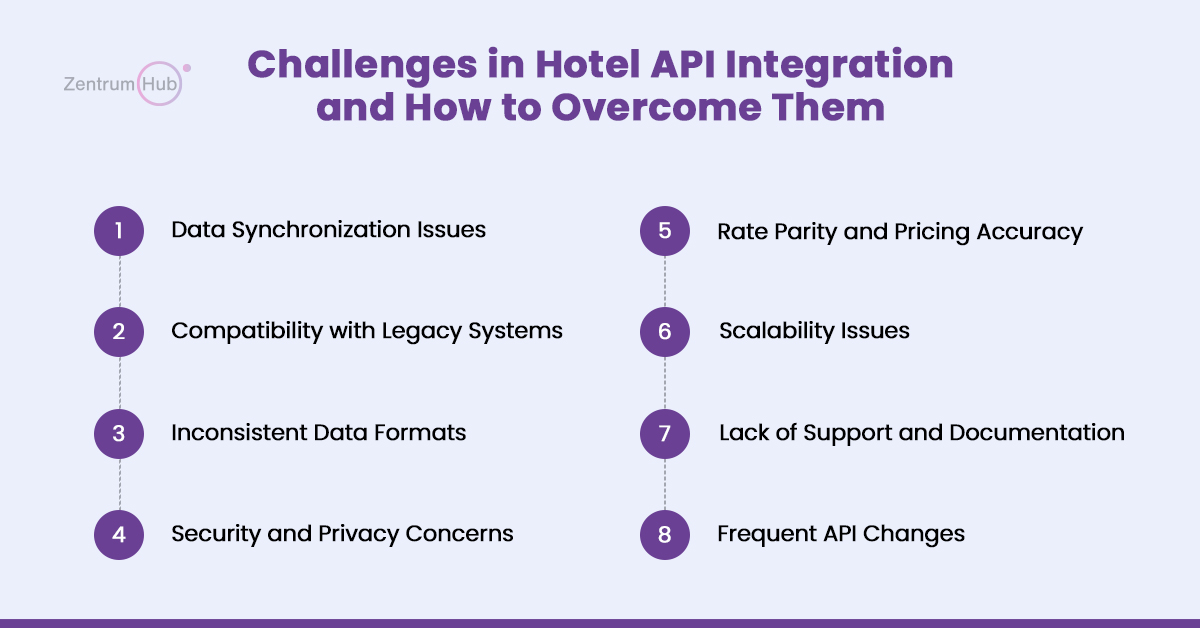As the hotel industry becomes increasingly reliant on technology, API integrations have emerged as a cornerstone for seamless operations, particularly in managing bookings, pricing, and availability.
Despite their significance, hotel API integration presents unique challenges. Addressing these obstacles is crucial for improving efficiency, guest satisfaction, and revenue.
Let’s explore some of the most common challenges in hotel API integration and effective strategies to overcome them.

1. Data Synchronization Issues
One of the common API issues in hotel operations is data synchronization across different platforms. Hotels rely on real-time data to manage room availability, pricing, and guest bookings. However, when APIs are not properly synced, this can lead to inconsistent information across the booking platforms, resulting in overbookings, pricing discrepancies, and a loss of trust from guests.
How to Overcome:
2. Compatibility with Legacy Systems
A significant hotel supplier integration problem is ensuring API compatibility with the hotel’s existing software infrastructure. Many hotels still operate on legacy systems that were not designed to integrate with modern APIs. This can create bottlenecks, especially when dealing with third-party services like OTAs (Online Travel Agencies).
How to Overcome:
3. Inconsistent Data Formats
Different hotel suppliers and OTAs often use varied data formats, which complicates integration. This inconsistency makes it difficult for systems to interpret information correctly, such as room rates, descriptions, or availability status, leading to errors.
How to Overcome:
4. Security and Privacy Concerns
APIs handle a significant amount of sensitive guest data, such as payment details and personal identification. Security breaches can not only lead to revenue loss but also damage the hotel’s reputation. One of the key challenges in hotel API integration is ensuring that the data exchanged between systems is secure.
How to Overcome:
5. Rate Parity and Pricing Accuracy
Hotels often face challenges ensuring that their pricing stays consistent across multiple booking platforms. API integration issues can lead to delays or inaccuracies in rate updates, causing discrepancies that affect the hotel’s rate parity agreements with OTAs.
How to Overcome:
6. Scalability Issues
As hotels grow or partner with more suppliers and OTAs, the complexity of managing multiple APIs increases. The system may struggle to keep up with demand, leading to slower response times and integration failures.
How to Overcome:
7. Lack of Support and Documentation
Poorly documented APIs can make integration a nightmare for development teams, resulting in delays or improperly functioning connections. This is especially true for third-party APIs from suppliers who may not provide sufficient support.
How to Overcome:
8. Frequent API Changes
APIs are often updated by vendors, and while updates can offer enhanced features or performance, they may also break existing integrations. Handling these common API issues requires proactive planning.
How to Overcome:
By addressing these hotel supplier integration problems through real-time updates, data standardization, security measures, and scalable solutions, hotels can unlock more efficient operations and enhance the guest experience.
The key to overcoming these challenges in hotel API integration lies in proactive planning, close collaboration with vendors, and investing in the right technologies.
Hotels that successfully navigate these obstacles will not only improve their internal processes but also position themselves as leaders in the highly competitive travel industry.
